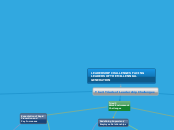LEADERSHIP CHALLENGES FACING LEADERS OF THE MILLENNIAL GENERATION
The 3 Triads of Leadership Challenges
Triad 1
Behavioral Challenges
Perception of
Entitlement
Stereotype created
by the media and society
Reflection of
Over-Indulgent
Parenting
Expectation that things
should go their way
Threat to traditional
hierarchy of management
Increased
Individualism
Less concerned about
well-being of others
Prefer to complete
tasks individually to
garner recognition
Greater emphasis on moral skills
less emphasis on competency skills
Desire clear rules,
direction, and structure
Collectivism
supported
Narcissistic
Behavior
Minimal noticeable differences in
levels between generations
Greater concern for the world
and more altruistic than
prior generations
More self-promoting and over-confident than prior generations
Generation "ME"
Influence view on leaders
and leadership positions
Inclination towards
white-collar crime
Speculative and hazardous
decision-making tendencies
Triad 2
Work Environment
Challenges
Expectation of Rapid
Promotion and
Pay Increases
Intrinsic values
influence work ethic
Seek validation from
peers and co-workers
more than financial gain
Seek employment providing
most immediate benefits
Expect to be promoted
within two years
May pursue unethical behavior
to achieve benefits they feel
deserving of
Redefining Supervisor/
Employee Relationships
more likely to quit if needs arent met
Generally lack loyalty to
their employer
Expect communication to be
frequent, affirming and positive
Want to know why their superiors
have them do tasks
Expect their opion to be
heard and valued at work
Want to know why superiors can't
provide rapid and personal feedback
Expectation that supervisors
support the subordinate
above all else
opportunity to harness their desire
to interact with leaders and utilize
their competence and creativity
employee development and
regard leaders as mentors
more likely to value working for
supervisors they like than prior gens
Chain of command is new
concept to them
Challenging
Authority
Positive relations hinge
on autonomy, direct
communication, and
social inclusion
Focus on social aspect,
friendly co-workers and
superiors, interesting
work environment
Distinct dislike of procedure
and hierarchical process
Frustration with
bureaucratic process
Exasperated with supervisors
who waste time, don't get to
point, and talk in circles
Challenge the
staus quo
Expect decision-making
to be collaborative and
individuals to actively
seek out being part of the
decision-making process
Triad 3
Work/Life Integration
Challenges
Greater Need for
Work/Life Balance
Reflects work quality
job performance,
ethical decision making
Healthy balance
between friendship
and teamwork
Millennial led organization
culture where being "human"
is expected in workplace
Time more important
than money
Demand fulfilling careers
and active social lives
Desire for greater leisure
and work/life balance
work to live not
live to work
shift from wealth accumulation
to wealth enjoyment
Want sacrifices to be
appreciated and rewarded
by extra time off or bonus
Disgusted with 50+
hour work week
Desire for Meaningful
Work and
Continuous Feedback
When given autonomy
and mentoring they
respond favorably to
management
Coaching and
achievement-based
feedback creating
dynamic relations
with management
Receptive to constructive
criticism if delivered in a nice
manner with recommendations
for improvement
Provide thorough
orientation, create a
"cool" workplace,
and help them chart
their career
Need for rapid responses
to queries and immediate
reaction to achievement
Not needing leadership
direction, yet demanding
substantial amounts of
positive feedback
Do not respond well
to negative or non-
constructive feedback
Delay in feedback
causes confusion
and distrust
Reliance on
Technology
Baby Boomers
respect millennial
capability with
technology
Extensive experience
with available technology
View technology as
efficient means to
build relationships
Willingness to
adapt to "gamifiication"
within the workplace
View work and life as
symbiotic, drawn together
by advancing technologies
Want to incorporate
social platforms to
learn and be more
efficient at their jobs
View communication
differently. Prefer text-
based and computer-
mediated approaches
Lack basic literary
skills coupled with
short attention spans
Expect same social
networking opportunities
on the job as in their
personal lives
